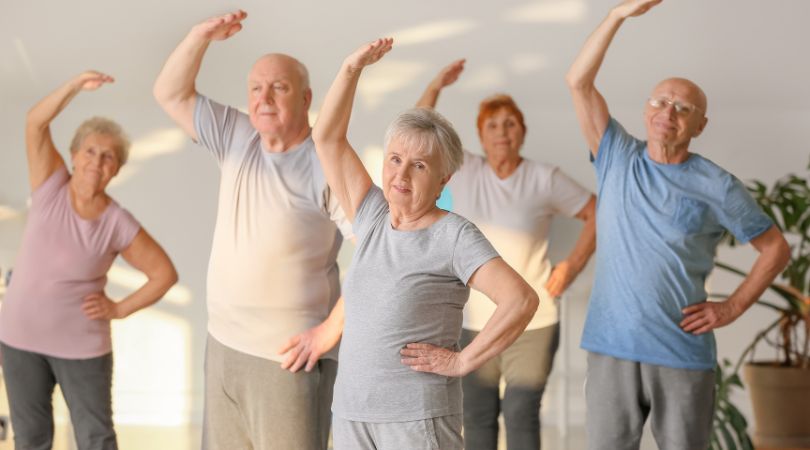As we journey through life, it’s important to prioritise our health and well-being, especially as we age. Staying fit and active plays a crucial role in maintaining physical strength, mental sharpness, and overall quality of life. In this post, we’re looking at various ways in which elderly members of our community can stay vibrant, energised, and engaged in life. From mindful eating to regular exercise, walking, socialising, and trying new activities, there are numerous avenues for older adults to lead an active and fulfilling lifestyle.
Mindful Eating:
Diet plays a vital role in our health, regardless of age. As we grow older, it becomes increasingly important to pay attention to our nutritional needs. Here are some tips to keep in mind:
a. Eat a balanced diet: Include a variety of fruits, vegetables, whole grains, lean proteins, and healthy fats in your meals. Aim for a colorful plate to ensure you’re getting a wide range of nutrients.
b. Stay hydrated: Drink plenty of water throughout the day to maintain optimal hydration and support bodily functions.
c. Limit processed foods and sugars: Minimise your intake of processed foods, sugary snacks, and beverages as they can contribute to various health issues.
Regular Exercise:
Exercise is crucial for maintaining strength, flexibility, and mobility. Engaging in regular physical activity can also enhance cardiovascular health, boost mood, and improve overall well-being. Consider the following exercise options:
a. Low-impact exercises: Gentle exercises like walking, swimming, or cycling are excellent choices for older adults as they put minimal stress on the joints while providing cardiovascular benefits.
b. Strength training: Incorporate resistance exercises, using light weights or resistance bands, to improve muscle strength and prevent age-related muscle loss.
c. Flexibility and balance exercises: Practices such as yoga, tai chi, and Pilates can enhance flexibility, balance, and stability, reducing the risk of falls.
Walking:
A simple and accessible form of exercise that can be enjoyed by people of all ages. It requires no special equipment and can be tailored to individual fitness levels. Here’s how to make the most of your walking routine:
a. Start gradually: Begin with shorter walks and gradually increase the duration and intensity as your fitness improves.
b. Find a walking buddy: Walking with a friend or joining a walking group can make the experience more enjoyable and provide an opportunity for socializing.
c. Explore new routes: Discover new walking paths, parks, or nature trails in your area to keep your walks interesting and engaging.
Socialising:
Maintaining an active social life is essential for overall well-being. Here’s why socialising is important and some suggestions on how to stay connected:
a. Combat loneliness: Regular social interaction can help combat feelings of loneliness and isolation, which can have negative effects on physical and mental health.
b. Join community groups: Look for local community centers, clubs, or organisations that offer activities of interest to you. Engage in hobbies, attend workshops, or join book clubs to meet like-minded individuals.
c. Volunteer: Giving back to the community by volunteering not only provides a sense of purpose but also allows you to meet new people and make a positive impact.
Trying Something New:
Embracing new activities keeps life exciting, stimulates the mind, and encourages personal growth. Here are some ideas to try:
a. Learn a new skill: Enroll in classes or workshops to learn a new skill or hobby, such as painting, cooking, or playing a musical instrument.
b. Embrace technology: Explore the digital world by learning to use smartphones, tablets, or computers. Engaging with technology can help you stay connected with loved ones and access a wealth of information and entertainment.
c. Explore the arts: Attend local theatre performances, visit museums, or join art appreciation groups to indulge in cultural activities and discover new interests.
Age should never be a barrier to leading an active and fulfilling life. By adopting healthy eating habits, engaging in regular exercise, walking, socialising, and trying new activities, elderly members of our community can enjoy a vibrant and meaningful lifestyle. Remember, it’s never too late to start making positive changes for your well-being. Embrace the journey of aging gracefully and savor the joys that come with it.


